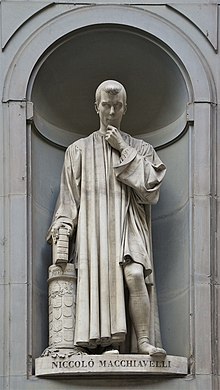In any case Machiavelli presented
himself at various times as someone
reminding Italians of the old virtues
of the Greeks.
himself at various times as someone
reminding Italians of the old virtues
of the Greeks.
Niccolò di Bernardo dei Machiavelli
[he was a diplomat, historian, philosopher, politician,
and a writer of the Renaissance period,
[a very famous man (Florence-Italian).
[he was a diplomat, historian, philosopher, politician,
and a writer of the Renaissance period,
[a very famous man (Florence-Italian).
In 1498 he became the secretary of the Ten in the Florentine Republic,
[with responsibilities in diplomatic affairs,
and his most renowned work "The Prince"
[was a book responsible for countless massacres and a sea of tears ....
The book itself gained notoriety when readers
[claimed that the author was teaching evil,
and providing evil recommendations to tyrants to maintain their power,
[a book of evil that causes social and political upheaval.
On the other hand, many commentators, such as Rousseau*
[and Diderot*, have argued that Machiavelli was actually a republican,
"The Prince", was an inspiration for Enlightenment,
[and it is wrong to be described as an anti-republican.
The Prince, as well as all Machiavelli's books were banned
[and put on the "Index of Prohibited Books".
The Catholic Church believed that Machiavelli promoted
[anti-Christian beliefs....but till now every eye in this book looks.
* ''IT COULD BE OTHERWISE in verse''
Texts and Narration: Odysseus Heavilayias - ROTTERDAM //
Language adjustments and text adaptation: Kellene G Safis -CHICAGO//
Digital adaptation and text editing: Cathy Rapakoulia Mataraga - PIRAEUS
______________________________________________________________
Language adjustments and text adaptation: Kellene G Safis -CHICAGO//
Digital adaptation and text editing: Cathy Rapakoulia Mataraga - PIRAEUS
______________________________________________________________
 |
| Statue at the Uffizi (art museum located adjacent to the Piazza della Signoria in the Historic Centre of Florence in the region of Tuscany, Italy. |
Political-military alliances continually changed, featuring condottieri (mercenary leaders), who changed sides without warning, and the rise and fall of many short-lived governments.
Commentators such as Leo Strauss have gone so far as to name Machiavelli as the deliberate originator of modernity itself. Others have argued that Machiavelli is only a particularly interesting example of trends which were happening around him. In any case Machiavelli presented himself at various times as someone reminding Italians of the old virtues of the Romans and Greeks, and other times as someone promoting a completely new approach to politics.
That Machiavelli had a wide range of influences is in itself not controversial.
* Machiavellianism, is a widely used negative term to characterize unscrupulous politicians of the sort Machiavelli described most famously in The Prince. Machiavelli described immoral behavior, such as dishonesty and killing innocents, as being normal and effective in politics. He even seemed to endorse it in some situations.
*Jean-Jacques Rousseau was a Francophone Genevan philosopher, writer, and composer of the 18th century. His political philosophy influenced the Enlightenment in France and across Europe, as well as aspects of the French Revolution and the overall development of modern political and educational thought.
*Denis Diderot was a French philosopher, art critic, and writer, best known for serving as co-founder, chief editor, and contributor to the Encyclopédie along with Jean le Rond d'Alembert. He was a prominent figure during the Enlightenment.
Diderot's literary reputation during his lifetime rested primarily on his plays and his contributions to the Encyclopédie; many of his most important works, including Jacques the Fatalist, Rameau's Nephew, Paradox of the Actor, and D'Alembert's Dream, were published only after his death.
*Denis Diderot was a French philosopher, art critic, and writer, best known for serving as co-founder, chief editor, and contributor to the Encyclopédie along with Jean le Rond d'Alembert. He was a prominent figure during the Enlightenment.
Diderot's literary reputation during his lifetime rested primarily on his plays and his contributions to the Encyclopédie; many of his most important works, including Jacques the Fatalist, Rameau's Nephew, Paradox of the Actor, and D'Alembert's Dream, were published only after his death.
ELEGHOS... at history

No comments:
Post a Comment
Note: Only a member of this blog may post a comment.